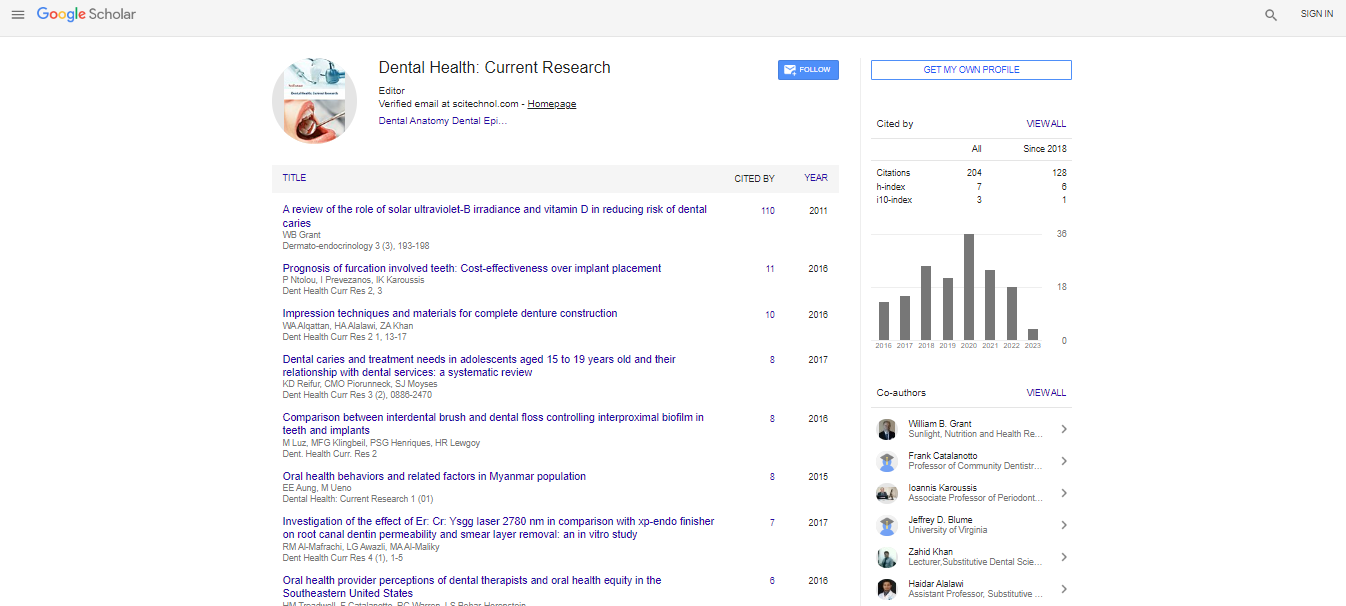Effect of sociodemographic variables on caries among preschool Saudi children
Mohammed Abdullah Alkahtani
Ministry of Health, Saudi Arabia
: Dent Health Curr Res
Abstract
Despite major advances in the field of caries prevention over the past few decades, there are several reports of high early childhood caries (ECC) prevalence in young children. Today, all experts on dental caries generally agree that it is an infectious and communicable disease and that multiple factors influence the initiation and progression of the disease. ECC is one of the most common dental conditions found in young children, and its prevalence appears to be increasing. The rates of ECC are highest among the socially disadvantaged such as low socioeconomic groups and indigenous and ethnic minorities. The behavioral risk factors that are directly involved in ECC have been well documented. ECC has been posing a challenge to the dental profession throughout the developing and developed world. In Saudi Arabia, dentists working with children have long expressed their concerns about the seriousness of the ECC problem. Social factors were shown to be the most important determinants of caries experience. Although the adverse feeding patterns associated with ECC are well described, the maternal psychosocial and cultural factors underlying these behaviors that place a child at risk for ECC are unclear. A mother’s health behavior often reflects her own personality and age as well as her familial, cultural, ethnic, and educational background. On the other hand, a mother is also influenced by her child’s response and temperament as well as community and cultural factors. Thus, there are highly complex pathways connecting a mother’s behavioral patterns with the child, family, and society that can impact on her child’s oral health. During the past few years, many epidemiological studies were carried out comparing caries prevalence and oral hygiene levels in children; however few studies are done in Saudi Arabia. Dental caries critically impacts the health and development of children. In order to combat dental caries in children, it’s important to investigate factors that could a ect the inanition and increase of carious process. ECC usually a ects primary dentition of children aged between 1 to 6 years old. ECC includes rampant caries, nursing caries and incipient caries. As known, ECC has many risk factors such as inappropriate feeding, inadequate oral hygiene, failure of professional dental care, frequent sugar snacks between meals and feeding bottles containing sweet fluid during bed- time, awareness of mother and the background of the parents play a great role in the process of ECC. As well as misconception and false beliefs in the community and the etiology of ECC. Mother’s education level has an active role in solution for this problem. All these factors represent important risk factors in ECC.
Biography
Mohammed Abdullah Alkahtani has completed his BDSc at the age of 25 years from MSA University dental school, Egypt. He is now general dentist at Ministry of Health in Saudi Arabia, he had been working as clinical instructor at Batarji Medical School, also private clinic as general practicing .He has involved in many volunteer work in Saudi society like mobile clinics, oral and breast cancer awareness. Also he has research and published experience.
E-mail: dr.mao87@gmail.com
 Spanish
Spanish  Chinese
Chinese  Russian
Russian  German
German  French
French  Japanese
Japanese  Portuguese
Portuguese  Hindi
Hindi 